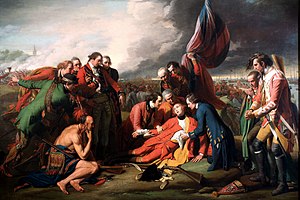Fall of Quebec
| Battle of the Plains of Abraham | |||||||
|---|---|---|---|---|---|---|---|
| Part of the Seven Years' War French and Indian War |
|||||||
 The Death of General Wolfe by Benjamin West. Oil on canvas, 1770 |
|||||||
|
|||||||
| Belligerents | |||||||
|
|
|
||||||
| Commanders and leaders | |||||||
|
James Wolfe † Robert Monckton |
Louis-Joseph de Montcalm † | ||||||
| Strength | |||||||
| 4,400 regulars | 1,900 regulars 1,500 colonial militia and natives |
||||||
| Casualties and losses | |||||||
| 58 killed 600 wounded |
116 killed 600–1,200 wounded |
||||||
Decisive British victory;
The Battle of the Plains of Abraham, also known as the Battle of Quebec (Bataille des Plaines d'Abraham, or Première bataille de Québec in French), was a pivotal battle in the Seven Years' War (referred to as the French and Indian War in the United States). The battle, which began on 13 September 1759, was fought by the British Army and Navy against the French Army on a plateau just outside the walls of Quebec City, on land that was originally owned by a farmer named Abraham Martin, hence the name of the battle. The battle involved fewer than 10,000 troops between both sides, but proved to be a deciding moment in the conflict between France and Britain over the fate of New France, influencing the later creation of Canada.
The culmination of a three-month siege by the British, the battle lasted about 15 minutes. British troops commanded by General James Wolfe successfully resisted the column advance of French troops and Canadien militia under General Louis-Joseph, Marquis de Montcalm, employing new tactics that proved extremely effective against standard military formations used in most large European conflicts. Both generals were mortally wounded during the battle; Wolfe received three gunshot wounds that ended his life within minutes of the beginning of the engagement and Montcalm died the next morning after receiving a musket ball wound just below his ribs. In the wake of the battle, the French evacuated the city; their remaining military force in Canada and the rest of North America came under increasing pressure from British forces.
While the French forces continued to fight and prevailed in several battles after Quebec was captured, the British did not relinquish their hold on the virtually impregnable Citadelle. That tenacity carried over to other areas in North America; within four years, France ceded most of its possessions in eastern North America to Great Britain in the Treaty of Paris.
...
Wikipedia
